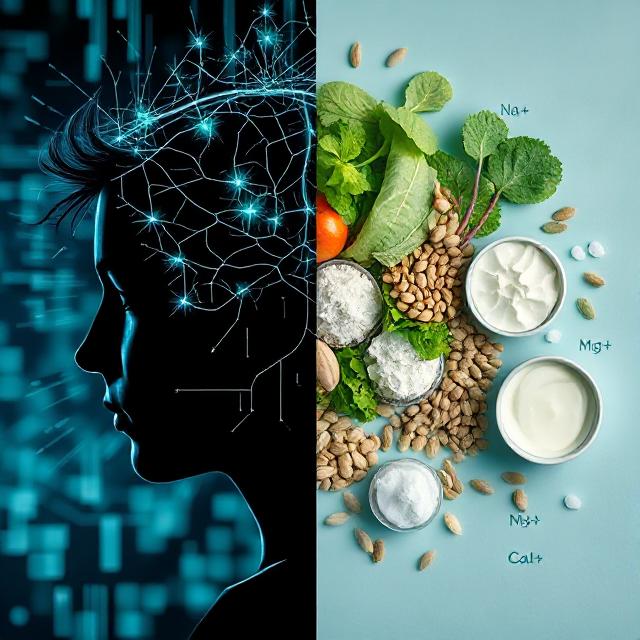
Table of Contents
Using Electrolytes to Calm Stress Responses
Stress doesn’t just drain your energy—it also disrupts your electrolyte balance, directly impairing brain function, mood stability, and cognitive resilience. While most people turn to caffeine, sugar, or supplements during high-stress days, the nervous system is often missing something more fundamental: minerals that help you stay grounded, calm, and sharp.
This article explores how to use electrolytes to calm stress, support your adrenal system, and protect your mental clarity when life hits hard.
🧠 How Stress Hijacks Your Mineral Balance
Every time you feel anxious, overworked, or emotionally tense, your brain triggers the sympathetic nervous system—commonly known as the fight-or-flight response.
This surge of adrenaline and cortisol leads to:
- Increased heart rate and respiration
- Faster excretion of sodium, potassium, and magnesium
- Shifting water out of cells (leading to dehydration)
- Heightened glucose demand in the brain
If this state becomes chronic, your electrolyte reserves deplete rapidly. The result? Mental fog, agitation, brain fatigue, and even sleep disruption.
Chronic stress burns through your brain’s mineral currency.
Without replenishment, the nervous system becomes unregulated and erratic.
⚖️ The 4 Essential Electrolytes That Calm the Nervous System
Let’s break down the key players in electrolyte-based stress control, how they work, and where to find them.
🧂 1. Sodium: The Stabilizer
- What it does: Maintains fluid balance, supports blood pressure, and helps neurons fire consistently.
- How it helps stress:
- Prevents low blood pressure crashes under adrenal fatigue
- Reduces dizziness and lightheadedness during anxiety spikes
- Supports morning alertness in burnout recovery
⚠️ Chronic stress + low sodium = mental burnout.
Best whole-food sources:
- Unrefined sea salt
- Bone broth
- Fermented pickles or olives
- Lightly salted avocado or cucumber
Use tip: Add a pinch of salt to warm lemon water or herbal tea in the morning during stressful weeks.
🍌 2. Potassium: The Balancer
- What it does: Opposes sodium to maintain electrical neutrality; supports insulin sensitivity and mood regulation.
- How it helps stress:
- Prevents overstimulation by calming nerve excitability
- Supports glucose transport to brain cells under duress
- Helps relax blood vessels and reduce cortisol spikes
Potassium is your anti-anxiety mineral—especially after caffeine or sugar.
Best whole-food sources:
- Bananas
- Coconut water
- Leafy greens
- Avocados
- White potatoes (with skin)
Use tip: Blend a banana, spinach, and coconut water for a calming post-stress smoothie.
🌰 3. Magnesium: The Relaxer
- What it does: Activates enzymes that regulate mood, sleep, and energy; blocks excess calcium in neurons (which causes overstimulation).
- How it helps stress:
- Supports GABA production (your main calming neurotransmitter)
- Reduces cortisol secretion and inflammation
- Improves sleep depth and brainwave recovery after intense days
Magnesium is depleted by every stressor: noise, screen time, pressure, fasting, overtraining.
Best whole-food sources:
- Pumpkin seeds
- Almonds
- Swiss chard or kale
- Dark chocolate (85%+)
- Sardines
Use tip: Snack on pumpkin seeds or sip magnesium citrate at night to restore calm.
🥛 4. Calcium: The Signal Modulator
- What it does: Controls muscle contraction and neurotransmitter release; maintains circadian rhythm.
- How it helps stress:
- Stabilizes neural firing in the hippocampus (memory and mood center)
- Supports physical relaxation (including heartbeat and muscle tone)
- Works with magnesium to balance stimulation
Without magnesium, calcium can overstimulate. The two must work in tandem for balanced stress response.
Best whole-food sources:
- Sardines (with bones)
- Full-fat yogurt or kefir
- Tahini
- Sesame seeds
- Cooked kale
Use tip: Eat sardines + greens for dinner to buffer evening stress and support sleep.
📊 Stress Response and Electrolyte Loss: The Hidden Loop
Here’s how stress and electrolyte imbalance form a vicious cycle:
- Stress event → body releases adrenaline → kidneys dump magnesium and sodium
- You feel tired, edgy, foggy → reach for caffeine or sugar
- Further mineral loss → worsened nerve function, mood swings, and sleep disruption
- More stress builds → deeper depletion
Breaking this cycle starts with re-mineralizing your nervous system daily—before it gets overwhelmed.
⏰ Timing Electrolytes for Nervous System Support
Timing matters. Here’s a suggested daily electrolyte rhythm for stress management:
| Time | Electrolyte Boost | Why |
|---|---|---|
| 7:00 AM | Warm water + lemon + pinch of sea salt | Supports adrenal alertness and morning cortisol rhythm |
| 10:30 AM | Coconut water + spinach + banana smoothie | Potassium + magnesium to prevent overstimulation |
| 2:30 PM | Avocado + lightly salted almonds | Stabilizes blood sugar and mood before the afternoon slump |
| 8:00 PM | Sardines + sautéed kale + tahini | Calcium + magnesium for pre-sleep parasympathetic activation |
💡 How to Tell If You’re Electrolyte-Depleted from Stress
You don’t always need a lab test. Listen to your nervous system.
Common signs include:
- Afternoon mental crashes
- Dry mouth despite drinking water
- Muscle twitches or cramps
- Anxiety that worsens after caffeine or screen time
- Poor sleep even after exhaustion
- Brain fog that improves with salt or potassium
If these symptoms sound familiar, your brain may be mineral-hungry, not just tired.
🧭 Final Thought: Electrolytes as Stress Modulators
You can’t eliminate stress—but you can change your body’s ability to adapt to it. Using electrolytes to calm stress isn’t about taking a magic pill—it’s about restoring your body’s natural ability to reset, focus, and recover.
Before you reach for another stimulant or supplement, ask:
Have I replenished what stress just took away?
With the right minerals in place, your brain can stay clear, your mood can stay balanced, and your focus can thrive—even in the chaos.